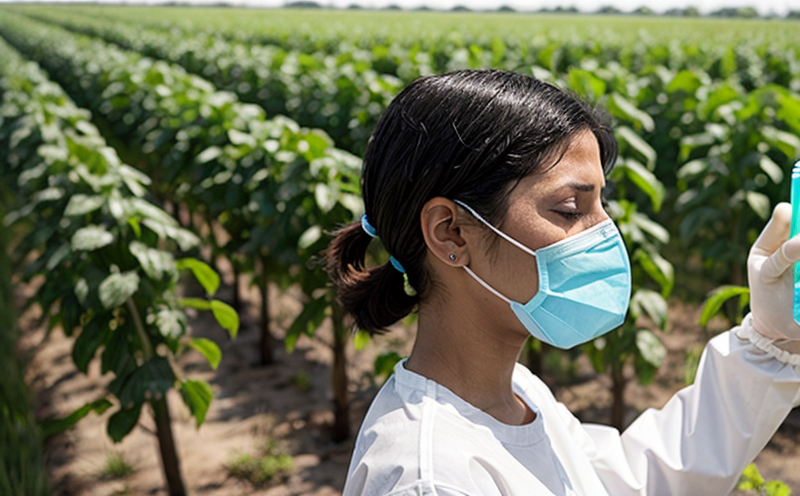OECD 210 Fish Early Life Stage Toxicity Test for Pesticides
The OECD 210 Fish Early Life Stage (ELS) Toxicity Test is a standardized protocol used to assess the acute toxicity of pesticides on fish embryos and larvae. This test is critical in environmental testing, particularly when evaluating the potential impact of pesticides on aquatic ecosystems.
Developed by the Organization for Economic Co-operation and Development (OECD), this method provides a reliable framework for measuring the lethal concentration 50% (LC50) or median effective concentration (EC50) values of pesticides on fish. The OECD 210 test focuses specifically on the early life stages, which are particularly sensitive to environmental stressors such as pesticides.
The protocol involves exposing fish embryos and larvae to a series of dilutions of the pesticide under controlled conditions. By monitoring survival rates over time, researchers can determine the lethal concentration that causes mortality in 50% of the test population (LC50) or the effective concentration causing a specific effect at 50% response (EC50). This information is invaluable for risk assessment and regulatory compliance.
The OECD 210 ELS test is widely recognized in both scientific research and environmental policy-making. It helps ensure that pesticides are used safely, minimizing harm to aquatic life and supporting sustainable agriculture practices. Compliance with this protocol ensures that testing results can be compared internationally and accepted by various regulatory bodies.
For quality managers and compliance officers, understanding the OECD 210 ELS test is crucial for ensuring that products meet stringent environmental standards. R&D engineers can leverage this information to develop safer pesticides while minimizing ecological impacts. Procurement professionals benefit from knowing which suppliers adhere to these rigorous testing protocols.
The OECD 210 ELS test ensures that the results are reliable, reproducible, and comparable across different laboratories. This standardized approach facilitates consistent evaluation of pesticide toxicity, supporting informed decision-making in environmental protection policies.
Why It Matters
The OECD 210 Fish Early Life Stage Toxicity Test is essential for understanding the potential impacts of pesticides on aquatic ecosystems and human health. By evaluating the acute toxicity of pesticides during the early life stages of fish, this test provides critical insights into environmental risk.
- Environmental Impact: Assessing pesticide effects on fish embryos and larvae helps identify potential risks to aquatic biodiversity.
- Sustainable Agriculture: Ensuring that pesticides are used safely minimizes harm to ecosystems while supporting agricultural productivity.
- Regulatory Compliance: Meeting international standards ensures that products can be marketed globally without facing regulatory challenges.
The OECD 210 ELS test is a cornerstone of environmental protection efforts, particularly in regions where pesticide use is prevalent. By providing reliable data on pesticide toxicity, this protocol supports the development of safer alternatives and informs policy decisions to protect water quality and aquatic life.
For stakeholders involved in quality management, compliance, R&D, and procurement, adherence to this test ensures that products meet stringent environmental standards. This not only promotes sustainable practices but also enhances product reputation and marketability.
Benefits
- Rigorous Standardization: The OECD 210 ELS test provides a standardized protocol for evaluating pesticide toxicity, ensuring consistent results across different laboratories.
- Regulatory Acceptance: Compliance with this standard ensures that testing results are accepted by various regulatory bodies and international organizations.
- Informed Decision-Making: By providing reliable data on pesticide effects, the test supports informed decision-making in environmental protection policies.
- Sustainable Practices: Ensuring safe pesticide use minimizes harm to ecosystems while supporting agricultural sustainability.
The OECD 210 ELS test is a vital tool for researchers and policymakers. Its standardized approach ensures that results are reliable, reproducible, and comparable across different laboratories. This facilitates consistent evaluation of pesticide toxicity and supports the development of safer alternatives.
For stakeholders involved in quality management, compliance, R&D, and procurement, adherence to this test ensures that products meet stringent environmental standards. This not only promotes sustainable practices but also enhances product reputation and marketability.
International Acceptance and Recognition
The OECD 210 Fish Early Life Stage Toxicity Test is widely recognized by international bodies, including the European Union (EU), the United States Environmental Protection Agency (EPA), and the World Health Organization (WHO). Compliance with this protocol ensures that testing results are accepted globally.
- European Union: The EU mandates compliance with OECD guidelines for pesticide registration. Tests conducted according to the OECD 210 ELS test are widely accepted within the EU regulatory framework.
- United States EPA: The US Environmental Protection Agency (EPA) accepts OECD-compliant tests, including the OECD 210 ELS test, for pesticide risk assessment.
- World Health Organization: WHO recognizes OECD standards as a benchmark for environmental testing, ensuring that results are globally comparable and accepted.
The widespread acceptance of the OECD 210 ELS test ensures that results can be shared internationally without facing regulatory challenges. This standardization supports consistent evaluation of pesticide toxicity and informs policy decisions to protect water quality and aquatic life.
For stakeholders involved in international trade, compliance with this protocol is essential for ensuring that products meet global standards. This not only promotes sustainable practices but also enhances product reputation and marketability.





